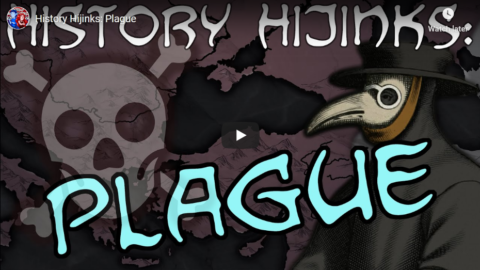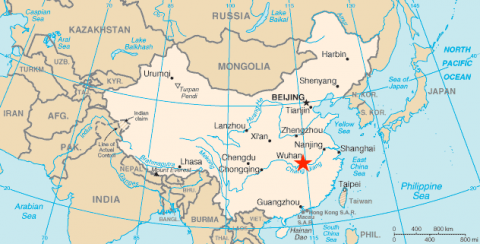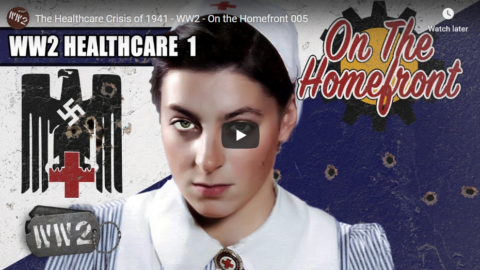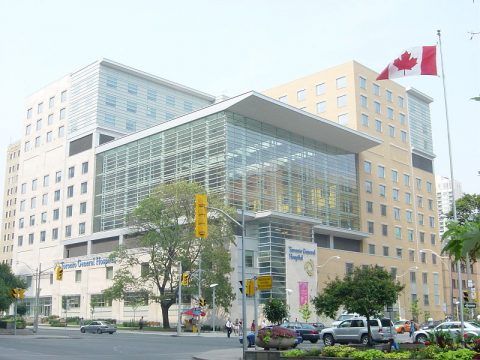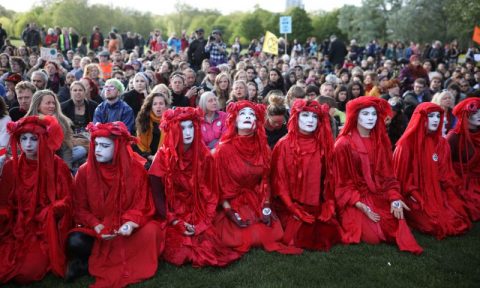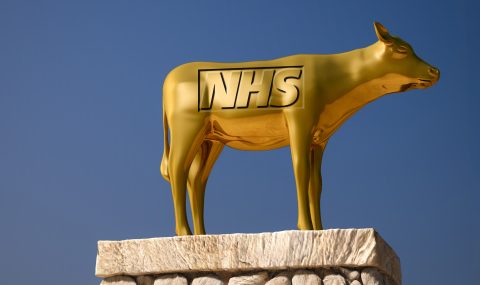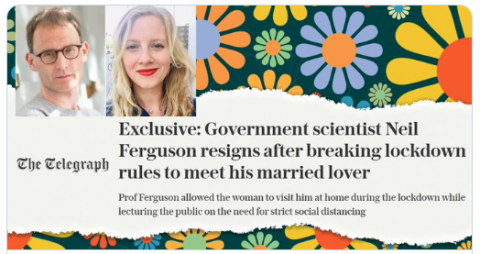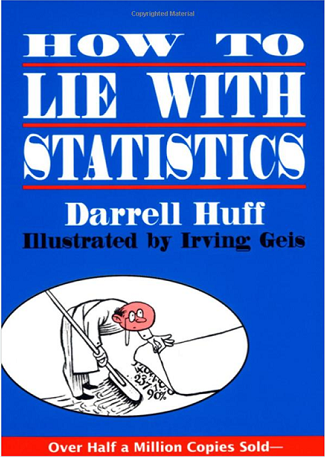… these same people want the government to provide them with free health care, and if they got their full way, other “positive liberties” (to quote Obama) including free college, free housing, free food, guaranteed income, guaranteed jobs.
[…] the moment all your necessities are furnished by someone else, someone else gets to make all the decisions for you. I mean, if your health is paid for by the taxes of your fellow citizens, and the government aka the nation looks after your every need: should they pay for your health if you insist on smoking or drinking? Or should those resources be husbanded for people who take better care of themselves? Okay, Sarah, but isn’t there a point to individual responsibility? Why shouldn’t you be required to take minimal care of yourself, so you get the benefits of the government’s care, which as you say someone else pays for.
Ah, but there’s the rub. See, ultimately, there’s always something some of us say or do that can be used to justify denying care or giving only palliative care. For instance, I’m overweight, which seems to be one of the remaining sins in the current lexicon. Sure, I gained tons of weight over 20 years of untreated hypothyroidism, even though I was starving myself for a long portion of those. But hey, I allowed myself to be overweight. So my prognosis is poor. Why spend money on me, when someone else could have better results?
Hell, even when it comes to my autoimmune. I’m a poor prospect, so why give me top of the line care?
If the government controlled other things, it would be exactly the same. Food? Sure, I break out in eczema all over when I eat a diet rich in carbs. But hey, flour and rice are cheap, and why should I get a specialized diet, since I’m only a writer who isn’t even a leftist or a supporter of the state, and besides my prospects of survival are poor?
College? Sure you want to be an economist, but your teachers say you’re cheeky and talk back, and the state doesn’t need that. What we need right now are pipe fitters. Here, you can take this six week course.
When the state is paying the bill, the state gets to decide what is better for you. The European constitution gives you the right to “death with dignity” because death with dignity is much cheaper than expensive treatments with a low chance of survival. After all this money is for everyone, you know?
And like the NHS, in Britain, they won’t even let you seek treatment outside their tender mercies. Why should they? They pay for you. That means in the end they decide what to spend on you. They own you. And if you went outside their system and your kid got cured? It would look pretty bad for them, wouldn’t it? Why should they allow you to do that? And besides, peasant, you have a bad attitude.
Sarah Hoyt, “Slouching Into Shackles”, According to Hoyt, 2018-04-27.
July 25, 2020
July 20, 2020
History Hijinks: Plague
Overly Sarcastic Productions
Published 17 Jul 2020Escape the worries of our modern world by visiting the high middle ages and learning about something esoteric and irrelevant: Plague!
In this video, I attempt to actually teach you something about how the medieval world worked and how it responded to this existential threat, rather than dredging up 3rd grade plague facts for easy views. Oops, did I say that out loud?
SOURCES & Further Reading: The Black Death: The World’s Most Devastating Plague via The Great Courses by Dorsey Armstrong, “From Plague Doctor to PPE” by Bernadette Banner (https://youtu.be/ZniriC-jTHg), “Biological Warfare at the Siege of Caffa” from the CDC (https://wwwnc.cdc.gov/eid/article/8/9…)
This video was edited by Sophia Ricciardi AKA “Indigo”. https://www.sophiakricci.com/
Our content is intended for teenage audiences and up.
DISCORD: https://discord.gg/kguuvvq
PATREON: https://www.Patreon.com/OSP
MERCH LINKS: https://www.redbubble.com/people/OSPY…
OUR WEBSITE: https://www.OverlySarcasticProductions.com
Find us on Twitter https://www.Twitter.com/OSPYouTube
Find us on Reddit https://www.Reddit.com/r/OSP/
July 7, 2020
Taking stock after the worst of the Wuhan Coronavirus epidemic
David Warren discusses an intractable “problem”:
I do not suppose it makes any practical difference what I have to say about a public health problem that invades the lives of billions; nor that readers will take me for a reliable epidemiologist when I say that the worst danger of that Batflu has now passed. (Infection rates spike, but the power of the virus to torture and kill has relented. The death rates continue downward.)
Nevertheless, I think there is some value in stating, even restating, the obvious — when what is obvious is in conflict with sensational reports, and the aggressive distortions of mass media, profiting from panic.
This Batflu became — more than any previous epidemic — a political issue, instantaneously. This is evident in the way it was spread, quite intentionally, by the Communist Party of China. (They shut down everything in Wuhan, except flights to Europe and America.) In all countries with democratic institutions, the disease became the centre of political attention, and unprecedented lockdowns were ordered. Likewise, unprecedented schemes of surveillance have significantly changed the relation between governments and governed, entirely for the worse. By means of current technology, the former will be able to perpetuate these changes, leaving those who wish to recover old liberties nowhere to hide.
Moreover, this is done by public demand. “The peeple” are easy to manipulate, once they have been frightened. The great majority of men, now and through the past, never cared about freedom. It has always been a minority concern, “for the intellectuals.” The “silent majority” will take their freedom, but only after their comfort and safety have been assured. The right to choose among consumer products is enough for them.
There are revolutions, such as the one that is now being attempted by the Left, but these never last. Either they are extinguished, under the wet blanket of public apathy, or the revolutionists succeed in installing a truly monstrous regime. Only thus, can they prolong their evil. Two generations of half-educated, indoctrinated, university grads favour a doctrinal dictatorship. Those still young are full of malign energy.
July 6, 2020
July 5, 2020
QotD: Gandhi and sanitation
It should be plain by now that there is much in the Hindu culture that is distasteful to the Western mind, and consequently is largely unknown in the West — not because Hindus do not go on and on about these subjects, but because a Western squeamishness usually prevents these preoccupations from reaching print (not to mention film). When Gandhi attended his first Indian National Congress he was most distressed at seeing the Hindus — not laborers but high-caste Hindus, civic leaders — defecating all over the place, as if to pay attention to where the feces fell was somehow unclean. (For, as V.S. Naipaul puts it, in a twisted Hindu way it is unclean to clean. It is unclean even to notice. “It was the business of the sweepers to remove excrement, and until the sweepers came, people were content to live in the midst of their own excrement.”) Gandhi exhorted Indians endlessly on the subject, saying that sanitation was the first need of India, but he retained an obvious obsession with excreta, gleefully designing latrines and latrine drills for all hands at the ashram, and, all in all, what with giving and taking enemas, and his public bowel movements, and his deep concern with everyone else’s bowel movements (much correspondence), and endless dietary experiments as a function of bowel movements, he devoted a rather large share of his life to the matter. Despite his constant campaigning for sanitation, it is hard to believe that Gandhi was not permanently marked by what Arthur Koestler terms the Hindu “morbid infatuation with filth,” and what V.S. Naipaul goes as far as to call the Indian “deification of filth.”
Richard Grenier, “The Gandhi Nobody Knows”, Commentary, 1983-03-01.
June 20, 2020
“What did you do in the Wuhan Coronavirus war, Daddy?”
Chris Selley metaphorically dons the garb of a war correspondent to report on how the Canadian government systematically mishandled the epidemic “war”:
At first, comparisons to wartime seemed a bit silly. All we were being asked to do, after all, was stay indoors. As the World Health Organization was declaring a pandemic 100 days ago, the commanders had everything under control: the borders, the epidemiology, the strategy, support for shuttered businesses and their employees. Traditionally, wartime puts those of us left on the home front to work whether we like it or not. This was entirely the opposite: the worst we would have to put up with — in theory, assuming government aid was as advertised — was the indignity of idleness. Collective inaction would flatten the curve, the forces of COVID-19 would be beaten back, and summer would be saved. Peace in our time.
And then it instantly turned to quagmire. Canadians watched slack-jawed as COVID-19 breached our most fundamental defences. You don’t need Sun Tzu’s perspicacity to inform people arriving in Canada of their responsibility to self-isolate, and exactly what self-isolation means — go directly home, do not stop for groceries, do not receive visitors. I just did it, right there, in half a sentence. But we couldn’t manage it: Where information was distributed at all, it was excessively complex even as it failed to deliver the central message. Provincial forces threatened mutiny. Alberta Commander-in-Chief Jason Kenney stormed into the Edmonton airport demanding answers. It took weeks to sort out.
[…]
If it didn’t seem like a war before, it sure did once the real live army was drafted in to bail out long-term care homes in Ontario and Quebec that had descended into horrifying squalor. We learned the appalling details from leaked military reports. And now, in an almost poetic act of military pigheadedness, the Ottawa Citizen reports the Armed Forces are trying to hunt down and punish the leakers.
The war must go on. But sitting here in still-locked-down Toronto, stewing in my own bile, I cannot say this is filling me with patriotic fervour. I find myself simultaneously envious of other provinces that are in the process of reopening, and sympathetic to their residents: If it weren’t for the two sick men of the federation [Ontario and Quebec] dominating the narrative, they would likely have reopened much earlier.
Indeed, jealousies have bloomed as weeks turned to months. Apartment dwellers envy other apartment dwellers who have balconies. All apartment dwellers envy homeowners. Everyone envies cottage-owners. Some cottage-country mayors have told cottage-owners to stay put and keep their infestations to themselves. People cooped up with their kids sometimes envy those with time to themselves; singletons who have had enough alone time to last a decade occasionally envy those trying to juggle kids with working from home. The pleasant novelty of Zoom-based socializing faded ages ago, as everyone realized that Zoom-based socializing sucks.
More than 8,200 Canadians are dead, most having lived long lives but many having died in grim and lonely circumstances. In future, considerably more deaths and distress will be associated with the lockdown itself. The psychological effects of this will be studied for decades. If war isn’t quite the right analogy, it’s certainly closer to a war than anything that has been contested on Canadian soil in my or my parents’ lifetime, and it will come at a greater cost to the whole of society than any actual war that Canadian forces have fought over that time. It’s a terrible shame that as a nation, we didn’t win.
June 14, 2020
June 3, 2020
Fanatics gonna fanatic … they can’t help it
It’s funny that no matter what the claimed crisis, the answers always go in the same direction, as Kristian Niemietz points out with the demands to turn our still unending lockdown toward “protecting the environment”:
The change, superficially, is to encourage “a safe return to work” allowing more social distancing between pedestrians, but more substantially in order to preserve the cleaner air that has resulted from the lockdown.
The health and safety excuse for the policy change can be largely dismissed. The simple truth of the pandemic and national policy is that if social distancing matters, the centre of London is not safe to return to work. It is too densely populated and almost entirely reliant on mass transit which cannot operate above 10-15% capacity with 2m exclusion rules. With average commutes over 9 miles each way, substitution effects to walking and cycling will be extremely limited and temporary.
It is then hard to see then how the policy’s architects imagine the streets will fill up to the extent urgent measures are needed. Conversely, if social distancing does not matter (and it will cease to matter eventually), then a policy to enable more social distancing outside by widening the pedestrian streetscape is redundant. If it is safe to sit on a crowded train, it is safe to walk on a crowded pavement. It is not hard then to cut through the pandemic packaging to note that the motive for this policy is opportunistic, to accelerate a pedestrianisation plan that is the dream of many an urban planner.
Many will see this as self-evidently a good thing. Removing vehicle traffic from densely populated narrow streets will reduce air pollution, congestion and road traffic accidents. As a policy it will have more supporters than opponents; very few people drive into the centre of London to commute and there is very little capacity for parking. London’s leaders are not wrong to think that this is the future, the question is really one of timing and how they go about it, which is far more difficult and does not have anything to do with managing a coronavirus.
What the pandemic allows is the ability to use emergency powers for something that is not an emergency. This matters, in normal times it took several years to close one dangerous junction at Bank to most traffic, and this under a hail of protests from local businesses and taxi drivers. The same result can now be achieved in a few weeks across many streets. The democratic checks and balances that differentiate the UK from authoritarian states can be ditched and London officialdom granted extraordinary powers to do as they please. If the protestors don’t like it this time, they should note the right to protest has also been suspended, at least for now.
May 29, 2020
May 28, 2020
Wuhan Coronavirus versus Canadian government planning and implementation
As Chris Selley illustrates, this was a clear failure for the various levels of government:
When Ontarians look back on the COVID-19 pandemic as the moment when their government finally ponied up the big bucks and fixed the province’s long-term care system, they will likely also wonder what the hell took so long. As appalled as everyone quite rightly is by the Canadian Forces’ report into the state of five long-term care homes that were in dire enough shape to require military intervention, we really shouldn’t be shocked. As the Ottawa Citizen in particular has reported in recent years, the system’s staffing levels were designed for a much less old, much less sick and much less Alzheimer’s-afflicted population than lives in them today — and it led to some terrible outcomes in normal times.
Perhaps it was easy to blame such incidents on individual villains: Ottawa support worker Jie Xiao, who was caught on video punching 89-year-old Georges Karam 11 times in the face; or Elizabeth Wettlaufer, one of Canada’s most prolific and yet somehow least-famous serial killers, who murdered at least eight senior citizens in long-term care homes during her red flag-festooned nursing career. Perhaps tales of society’s most vulnerable being forced to wallow in their own filth, or even just left alone in confusion and misery, are too much for the human mind to contemplate at length.
In any event, it only stood to reason that a virus as potent as the one that causes COVID-19 would exploit weak points in a long-term care system. Between wandering patients, fans circulating air throughout facilities and a lack of basic sterilization control, you would almost think these five facilities wanted the virus to spread. It’s a wretched understatement to say we can do better.
We shouldn’t fool ourselves, though: Long-term care homes will always be uniquely vulnerable. And as the economy reopens, it’s essential we keep focusing on them. It’s essential that we focus, period.
There is a tendency among media in Central Canada to treat “Canada’s COVID-19” outbreak as a single thing affecting all of society. It clearly isn’t. The numbers are all over the map. Quebec has reported by far the most cases and deaths: 5,655 and 480 per million population, respectively. Ontario is at roughly one-third of that: 1,778 cases per million and 144 deaths per million. At 1,569 cases per million, Alberta has a comparable number of cases to Ontario — but far fewer deaths, at just 31 per million. British Columbia has the same death rate as Alberta, but with only one-third as many cases. Saskatchewan, Manitoba, Newfoundland and New Brunswick have reported just 18 deaths between them. Quebec has nearly 30,000 active cases; Ontario has just over 6,000; Manitoba has 16.
May 27, 2020
Comprehensive planning and communication failures are the hallmark of Canada’s response to the Wuhan coronavirus epidemic
Chris Selley understands why the internet shaming community is dunking on the apparently large number of people who crowded into Toronto’s Trinity-Bellwoods park over the weekend but doesn’t feel the need to join them:
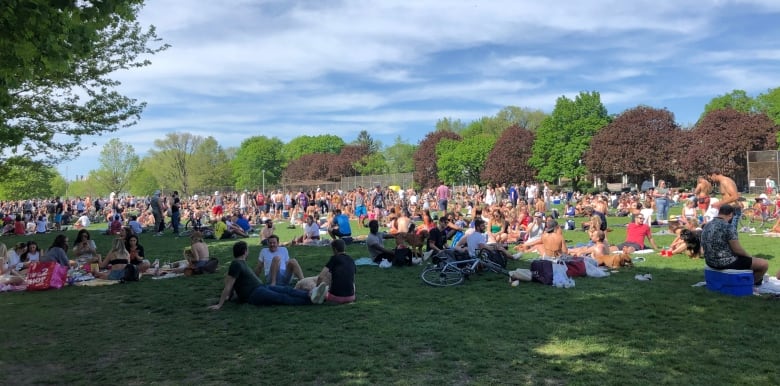
Screencap from a CBC report on unorganized social distancing civil disobedience at Toronto’s Trinity-Bellwoods Park on Saturday.
Human beings need to get outside and socialize. They have breaking points, and many are very understandably at them. (An aside: I can’t help noticing how many people venting fury on social media have also treated their followers to images of their back-patio office setups, or updates on their new vegetable gardens.) There is also no surplus of parkland in downtown Toronto. Photographic evidence suggests other neighbourhood greenspaces were very busy as well, though not to the same extent.
In other words, this was always going to happen. So the time is long past when politicians like Ontario Premier Doug Ford or Toronto Mayor John Tory should be able to cluck their tongues or stamp their feet at such people and expect their constituents to nod along in solidarity.
Jurisdictions facing significant COVID-19 outbreaks had one finite period of time in which to try to knock this bastard virus down. After that period of time, the socioeconomic costs of the shutdown would become unsustainable and the economy would have to reopen. We’re seeing that happen all over the world right now: in essence, countries are rolling the dice. If they did well in the allotted time, fewer people will have to die in the name of getting back to normal.
The federal, Ontario and Toronto governments have not done well — certainly not to any extent that justifies their leaders’ soaring approval ratings.
The feds have been abysmal since even before Day One, with Chief Public Health Officer Theresa Tam actively downplaying the threat. We shipped 16 tonnes of personal protective equipment to China with no viable plan to replace it. Whatever you think of travel bans as an anti-pandemic measure, the government undermined its own credibility by insisting they don’t work, then changing course 180 degrees over the course of a weekend. Most astonishingly, the feds at first utterly failed to communicate the most basic advice to returning travellers — advice such as “don’t stop for groceries or at the pharmacy on your way home.”
And Tam’s initial ludicrous “masks don’t work” narrative has grudgingly evolved to support the use of non-medical masks “where social distancing is not possible.” But the federal government’s official advice on “safe shopping” — indeed the entire web page titled “COVID-19 and food safety” — still doesn’t mention masks, even as the berth shoppers give each other seems to narrow by the day. This anti-mask stance seems to be ideological, bred in the bone.
May 22, 2020
The NFL’s (tentative) plan for the 2020 season
At FEE, Jon Miltimore explains what the league’s officials are thinking based on the announcement earlier this week:
Football fans around the world have been anxiously waiting for signs as to whether the NFL season will kick off in September despite concerns about the COVID-19 pandemic.
This week, they got the “burning bush” of signs.
The NFL on Tuesday had a soft opening of sorts, opening a number of facilities around the country to personnel, owners, and players rehabilitating from injuries. But it was in a post-meeting conference call with media that NFL officials delivered a bombshell of sorts.
According to multiple reports, NFL executive vice president Jeff Miller and Allen Sills, the NFL’s chief medical officer, told reporters the NFL fully expects to have COVID-19 cases during the NFL season, and are planning accordingly.
“We have a task force working very diligently on that,” Sills told reporters. “We fully well expect that we will have positive cases that arise because we think that this disease will remain endemic in society. And so it shouldn’t be a surprise if new positive cases arise. Our challenge is to identify them as quickly as possible and to prevent spread to any other participants. So we’re working very diligently on that, and we’ll have some detailed plans to share about that at a later time.”
It did not take long for reporters to process and interpret what the NFL was saying.
“You didn’t even have to read deeply between the lines,” said Charles Robinson, Yahoo’s senior NFL reporter. “What I just heard from the NFL was, ‘Hey, guess what? We are going to open. There is going to be a season. And we are going to have some people test positive for coronavirus once that season begins. And we’re working on a plan to not stop anything. We’re going to work through it.'”
Terez Paylor, a senior writer who also covers the NFL for Yahoo, concurred.
“He’s saying they’re going to play,” Paylor said in a podcast with Robinson. “Basically [they’re saying], ‘People are gonna get it. We’ll try to deal with it the best we can.'”
To be clear, the NFL has made no official decision yet. That being said, it looks like they are heading in that direction.
While some will say it would be reckless to hold the NFL season during a pandemic, it appears the NFL is making its decision based on some of the same assumptions Sweden used in its unique approach to COVID-19.
Anders Tegnell, Sweden’s top infectious disease expert and the architect of its “soft-approach” strategy, said one of the reasons he rejected sweeping lockdowns is because the measures simply are not sustainable, considering COVID-19 is going to be with us for years.
May 18, 2020
Safetyism
Safetyism is a disposition that has been gaining strength for decades and is having a triumphal moment just now because of the virus. Public health, one of many institutions that speak on behalf of safety, has claimed authority to sweep aside whole domains of human activity as reckless, and therefore illegitimate.
I suspect the ease with which we have lately accepted the authority of health experts to reshape the contours of our common life is due to the fact that safetyism has largely displaced other moral sensibilities that might offer some resistance. At the level of sentiment, there appears to be a feedback loop wherein the safer we become, the more intolerable any remaining risk appears. At the level of bureaucratic grasping, we can note that emergency powers are seldom relinquished once the emergency has passed. Together, these dynamics make up a kind of ratchet mechanism that moves in only one direction, tightening against the human spirit.
Acquiescence in this appears to be most prevalent among the meritocrats who staff the managerial layer of society. Deferring to expert authority is a habit inculcated in the “knowledge economy”, naturally enough; the basic currency of this economy is epistemic prestige.
Among those who work in the economy of things, on the other hand, you see greater skepticism toward experts (whether they make their claim on epistemic or moral grounds) and less readiness to accept the adjustment of social norms by fiat – whether that means using new pronouns or wearing surgical masks. I am regularly in welding supply stores, auto parts stores and other light-industry venues. Nobody is wearing masks in these places. They are very small businesses: an environment largely free of the moral fashions and corresponding knowledge claims that set the tone in large organisations. There is no HR in a welding shop.
A pandemic is a deadly serious business. But we would do well to remember that bureaucracies have their own interests, quite apart from the public interest that is their official brief and warrant. They are very much in the business of tending and feeding the narratives that justify their existence. Further, given the way bureaucracies must compete for funding from the legislature, each must make a maximal case for the urgency of its mission, hence the necessity of its expansion, like a shark that must keep moving or die. It is clearer now than it was a few months ago that this imperative of expansion puts government authority in symbiosis with the morality of safetyism, which similarly admits no limit to its expanding imperium. The result is a moral-epistemic apparatus in which experts are to rule over citizens conceived as fragile incompetents.
But what if this apparatus were revealed to be not very serious about safety, the very ideal that underwrites its authority? What then?
May 12, 2020
Dave Grohl on live music
Writing in The Atlantic, he regrets having to miss a particular event:

Dave Grohl and the Foo Fighters at Rock am Ring, 3 June 2018.
Photo by Andreas Lawen via Wikimedia Commons.
Where were you planning to be on the Fourth of July this year? Backyard barbecue with your crankiest relatives, fighting over who gets to light the illegal fireworks that your derelict cousin smuggled in from South Carolina? Or maybe out on the Chesapeake Bay, arguing about the amount of mayonnaise in the crab cakes while drinking warm National Bohemian beer? Better yet, tubing down the Shenandoah with a soggy hot dog while blasting Grand Funk Railroad’s “We’re an American Band”?
I know exactly where I was supposed to be: FedExField, outside Washington, D.C., with my band Foo Fighters and roughly 80,000 of our closest friends. We were going to be celebrating the 25th anniversary of our debut album. A red, white, and blue keg party for the ages, it was primed to be an explosive affair shared by throngs of my sunburned hometown brothers and sisters, singing along to more than a quarter century of Foo.
Well, things have changed.
Unfortunately, the coronavirus pandemic has reduced today’s live music to unflattering little windows that look like doorbell security footage and sound like Neil Armstrong’s distorted transmissions from the moon, so stuttered and compressed. It’s enough to make Max Headroom seem lifelike. Don’t get me wrong, I can deal with the monotony and limited cuisine of quarantine (my lasagna game is on point!), and I know that those of us who don’t have to work in hospitals or deliver packages are the lucky ones, but still, I’m hungry for a big old plate of sweaty, ear-shredding, live rock and roll, ASAP. The kind that makes your heart race, your body move, and your soul stir with passion.
There is nothing like the energy and atmosphere of live music. It is the most life-affirming experience, to see your favorite performer onstage, in the flesh, rather than as a one-dimensional image glowing in your lap as you spiral down a midnight YouTube wormhole. Even our most beloved superheroes become human in person. Imagine being at Wembley Stadium in 1985 as Freddie Mercury walked onstage for the Live Aid benefit concert. Forever regarded as one of the most triumphant live performances of all time (clocking in at a mere 22 minutes) Freddie and Queen somehow managed to remind us that behind every rock god is someone who puts on their studded arm bracelet, absurdly tight white tank, and stonewashed jeans one pant leg at a time just like the rest of us. But, it wasn’t necessarily Queen’s musical magic that made history that day. It was Freddie’s connection with the audience that transformed that dilapidated soccer stadium into a sonic cathedral. In broad daylight, he majestically made 72,000 people his instrument, joining them in harmonious unison.
May 9, 2020
Lies, damned lies, and even-more-damned statistics
David Warren does not trust “the numbers” (and I think he’s quite right to doubt):
At some point — but it is seldom a discrete moment in space or time — the weight of the anecdotal in science, or that of the circumstantial in law, becomes overwhelming. This is the opposite of a statistical fact, in part because there are no statistical facts. I am reminded of this whenever the “scientific” control freaks of statistics lay down some law, indifferent to the Law in nature. The difference between 999,999 and one million is, in any imaginable situation, not a difference at all. Where it is made the basis for a decision, that decision is arbitrary, and not infrequently, cruel. By contrast, such differences as those between pregnant and not pregnant, dead and not dead, are unchallengeably significant. They are in the realm of meaning.
I am reminded of this hourly or better, these days, when consulting the news. All readers of the mass media (accurately described by Trump as “fake news”) are being covered, constantly, by the vomit of statistics — few with any context, and many knowingly false. They “look scientific,” which is to say, they answer to the moron’s conception of science. In “disciplines” like economics, today, and throughout the other social sciences, the participants sleepwalk. Nobel prizes are given out for numerical sludge, presented to the purpose of selling one destructive “policy” or another, that will be imposed on real, live, particular human beings. The same is true of the “mathematical biology” that has disinformed all our public health “professionals.”
The Red Chinese Batflu, now transforming our world, is a spectacular case in point. Not only the epidemiological projections, but even the counts of dead and wounded, are taken on faith — from people who are characteristically faithless. Information on prevention and cures is hostage to the work of statisticians. “Double blind tests,” which would be absolutely immoral — wicked — on human subjects facing life or death — are demanded by our medical apes.

